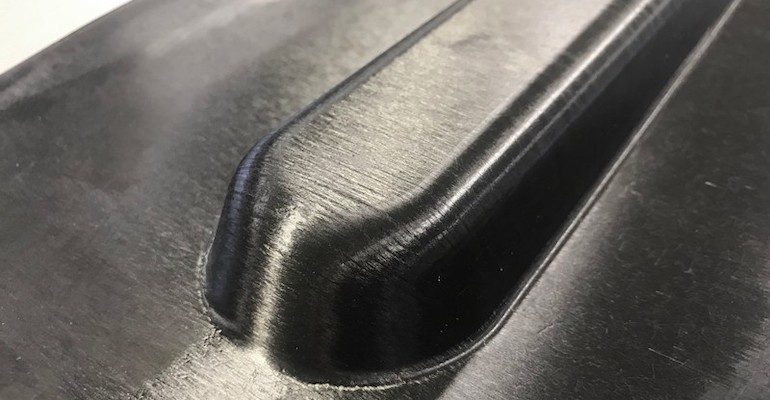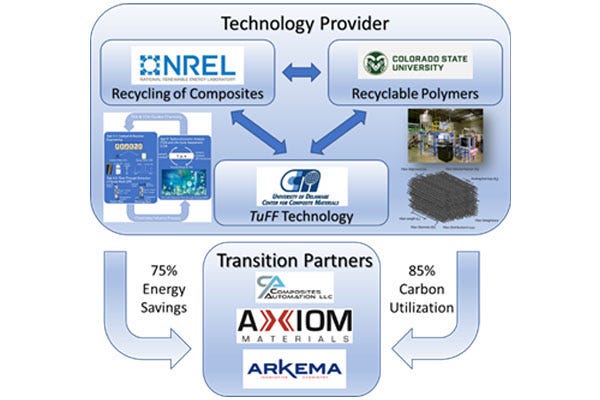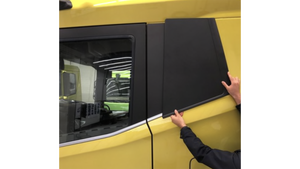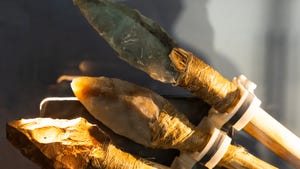Projects include recycling of carbon fiber composites.
October 20, 2020

The U.S. Department of Energy (DOE) has detailed over $27 million in funding for 12 projects that will support the development of advanced plastics recycling technologies and new plastics that are recyclable-by-design. As part of DOE’s Plastics Innovation Challenge, these projects will also help improve existing recycling processes that break plastics into chemical building blocks, which can then be used to make new products.
“The Trump Administration is committed to advancing innovation to position the U.S. as a global leader in advanced plastics recycling and upcycling technologies,” said Deputy Secretary of Energy Mark W. Menezes. “These new projects support that objective through the development of energy-efficient recycling technologies that will strengthen U.S. competitiveness and help reduce plastic waste in our environment for generations to come.”
In auto-related research, the University of Akron has received $2,049,242 to develop highly recyclable thermosets for lightweight composites. Partners include Pacific Northwest National Laboratory and Raytheon Technologies Research Center. The project will show thermoset composites can be produced from >50 wt. % bio-based carbon sources (CO2 and biomass) with chemical and thermal recyclability.
|
The TuFF process uses a short fiber composite material that can be stamped into complex shapes, just like sheet metal can be stamped into complex shapes, just like sheet metal. Image: University of Delaware. |
The group aims to develop novel highly recyclable thermoset materials, termed vitrimers, that combine mechanical advantages of thermosets with the recyclability of thermoplastics. The enabling technology will replace the permanent cross-links in conventional thermosets with dynamic bonds that can be thermally triggered to undergo bond exchange to change the network topology. CFRP prototype parts will be fabricated for testing to evaluate mechanical performance and durability for comparison with the baseline technology – non-recyclable carbon fiber/epoxy thermoset systems.
Carbon fiber composites (CFCs) recycling is in its infancy as an industry in the US with the key challenges being 1) the ability to recover both the fiber and polymer content, and 2) conversion of the recycled material into high-value CFC without significant property loss, reducing original embodied energy and cost. The University of Delaware - Center for Composite Materials (UD-CCM) will team up with members of the BOTTLE consortium including the National Renewable Energy Laboratory (NREL) and Colorado State University (CSU) to address these challenges, and develop and demonstrate a novel CFC recycling process. Funding of $2,499,983 has been secured. Other partners include Altair, Arkema, Axiom, Colorado State University, and Composites Automation.
NREL and CSU will develop the fiber/polymer separation and depolymerization process and UD-CCM will demonstrate CFC processing of the recycled discontinuous fiber content using the Tailorable universal Feedstock for Forming (TuFF) stamping process.
A third project at the University of California, San Diego will investigate the production of high-performance biodegradable polyurethane products made from algae precursors with DOE funding of $2,000,000. Partners include Algenesis, BASF, Pepsi, Reef, and University of California – Davis.
The proposed work describes the incorporation of microbial spores into thermoplastic polyurethanes (TPU) to form biofunctional composite materials. The microbial spore will serve as a functional filler, but more importantly as catalysts to promote biodegradation at the end of the composite material’s lifecycle.
About the Author(s)
You May Also Like





